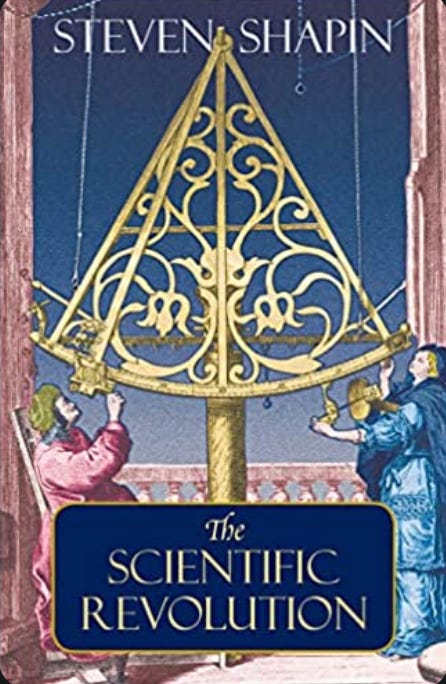Book Recs on the History of Science
"This is not to attack or devalue science, but to reveal its richness as the human endeavor that it most surely is."
Last Tuesday marked the anniversary of Einstein’s famous 1905 paper describing mass-energy equivalence, commonly known by the iconic equation E = Mc^2.
It was a part of Einstein’s Miracle Year, during which he also published papers describing the very foundation of modern physics: the photoelectric effect, Brownian motion (existence of atoms), special relativity, and mass-energy equivalence.
Reflecting on the history of our modern world (we wouldn’t have solar panels, nuclear weapons, GPS, and numerous other technologies if it weren’t for those 1905 discoveries) I realized that I still have a fuzzy understanding of how we got here and where we’re going.
Taking a class in college on the philosophy of science, I realized that completely wrong theories sounded truly quite compelling at the time.
Take, for example the classic question of geocentrism vs heliocentrism. In school, we’re taught that Galileo was a brave astronomer who stood up to an oppressive political regime, fighting for the truth of our Copernican heliocentric solar system.
It turns out that the Ptolomeic geocentric model — suggesting that everything revolved around the Earth — had explanations that other models couldn’t provide. For example: if we revolve around the Sun, why can’t we see any stellar parallax (near stars should move less than far stars from our perspective)?
The math worked out for the geocentric model, and the heliocentric model was incomplete. Yet obviously we know how things actually work now.
I found this to be a rather compelling lesson generally. The evidence for geocentrism really did line up. And the best scientists created complex mathematical models describing geocentrism. But ultimately Copernicus was right, despite not being able to build a complete explanation of the starry night.
It’s surely naive to assume that we’ve reached the end of scientific history. “Great” theories will be proven wrong, and questionable models may turn out to be correct. This is why studying scientific history matters.
As one review so brilliantly wrote:
"This is not to attack or devalue science, but to reveal its richness as the human endeavor that it most surely is."
On to the books!
Science Since Babylon. “This timely classic investigates the circumstances and consequences of certain vital decisions relating to scientific crises that have brought the world to its present state of scientific and technological development. It calls for a completely new range of studies to take its place in the territory between the humanities and the sciences.”
The Structure of Scientific Revolutions. “With The Structure of Scientific Revolutions, Kuhn challenged long-standing linear notions of scientific progress, arguing that transformative ideas don’t arise from the day-to-day, gradual process of experimentation and data accumulation but that the revolutions in science, those breakthrough moments that disrupt accepted thinking and offer unanticipated ideas, occur outside of “normal science,” as he called it. Though Kuhn was writing when physics ruled the sciences, his ideas on how scientific revolutions bring order to the anomalies that amass over time in research experiments are still instructive in our biotech age.”
Tuxedo Park. “Legendary financier, philanthropist, and society figure Alfred Lee Loomis gathered the most visionary scientific minds of the twentieth century—Albert Einstein, Werner Heisenberg, Niels Bohr, Enrico Fermi, and others—at his state-of-the-art laboratory in Tuxedo Park, New York, in the late 1930s. He established a top-secret defense laboratory at MIT and personally bankrolled pioneering research into new, high-powered radar detection systems that helped defeat the German Air Force and U-boats. With Ernest Lawrence, the Nobel Prize–winning physicist, he pushed Franklin Delano Roosevelt to fund research in nuclear fission, which led to the development of the atomic bomb.”
The Scientific Revolution. “In the last ten years, a new school of sociology has grown up that sees science as not only relativistic but as a purely human construct; that ties scientists' findings about "nature" to their standing in the cultural and political milieu of which they are a part. Steven Shapin adds to this revisionist literature with a fascinating, paradoxical book that at once questions our notions of the scientific revolution of the last century and deepens our understanding of it. Shapin examines four themes in the history of modern science: mechanism (the idea of nature as a machine); objectivism; methodology and impartiality; and altruism (the idea that science can better the lot of mankind). He does so in three deft, incisive sections: "What Was Known?"; "How Was It Known?"; and "What Was the Knowledge For?" This excellent study, written for the layman, explains how the scientists' world shaped their knowledge of the natural world.”
The Making of the Atomic Bomb. “The definitive history of nuclear weapons and the Manhattan Project. From the turn-of-the-century discovery of nuclear energy to the dropping of the first bombs on Japan, Richard Rhodes’s Pulitzer Prize–winning book details the science, the people, and the sociopolitical realities that led to the development of the atomic bomb.”
Have other recs? Reply to this email and let me know!
Views expressed in any content, including posts, linked on this website or posted to social media and other platforms are my own and not the views of Contrary LLC or any affiliate. None of the content should be construed or relied upon in any manner as investment, legal, tax, or other advice. You should consult your own advisers as to these matters. Under no circumstances should any posts or content be construed as any offer to provide advisory services or a solicitation of any investment in any security or investment vehicle. Certain information has been obtained from third party sources and has not been independently verified. The content speaks only as of the date indicated. Any projections, estimates, forecasts, targets, prospects, and/or opinions expressed in these materials are subject to change without notice and may differ or be contrary to opinions expressed by others. Past performance is not necessarily indicative of future results. See contrary.com/legal for additional important information.






